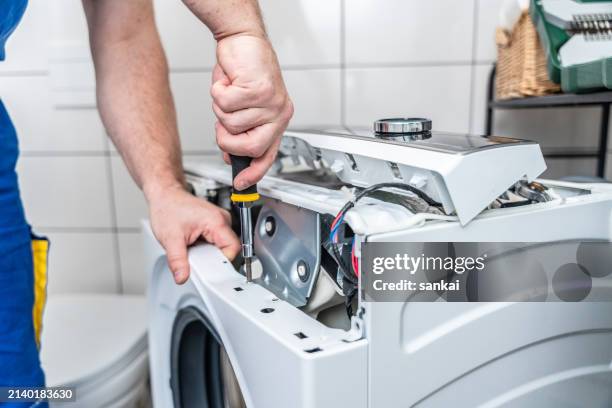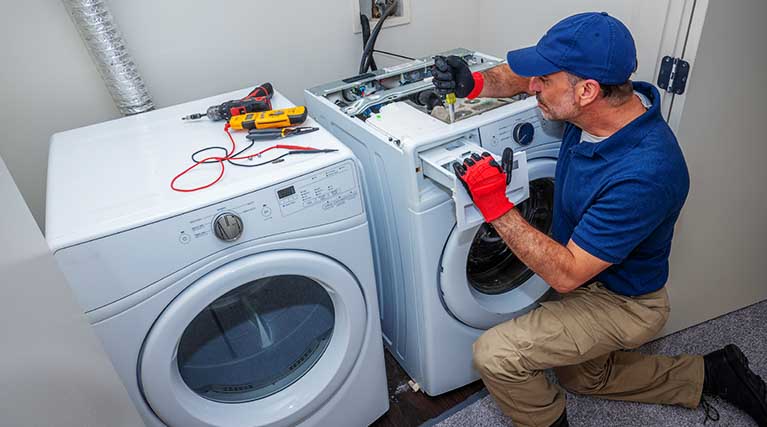The Ultimate Overview to Comprehending Appliance Repair at Home
When your fridge stops cooling down or your stove declines to warm, it can feel frustrating. Understanding appliance repair work in the house can save you time and cash. You'll discover to acknowledge signs and symptoms, utilize necessary devices, and adhere to an organized troubleshooting process. But before you start, there are critical safety preventative measures you need to take into consideration. What are the most typical issues, and how can you repair them? Allow's discover the essentials.
Common Appliance Troubles and Their Symptoms
When your appliances start breaking down, it's necessary to recognize the indications early. Neglecting them can bring about bigger issues and expensive repair work. For instance, if your fridge isn't cooling correctly, you may see warm areas or condensation forming. This could indicate a stopping working compressor or an obstructed vent.Your dish washer may show problems through unclean dishes or unusual sounds during cycles. If you listen to grinding or clanking, it's time to investigate.A cleaning machine that will not rotate or drain pipes can leave you with soggy laundry, suggesting a stopped up drain or a malfunctioning pump.Lastly, if your stove's temperature seems off or it takes for life to pre-heat, you may be handling a malfunctioning thermostat. By remaining sharp to these signs and symptoms, you can resolve problems prior to they intensify into major fixings.
Essential Devices for Device Repair
When you're taking on home appliance repair services at home, having the right devices is essential. Basic hand tools like screwdrivers and pliers will certainly assist you disassemble and deal with numerous devices, while electrical testing tools assure you're functioning securely with electrical wiring. Let's look at what you require to begin on your repair journey.
Fundamental Hand Tools
Having the right tools is necessary for efficient home appliance repair service at home. Start with a trusted screwdriver set, including both flathead and Phillips types, as screws are common in appliance setting up. Pliers are also essential; they assist with gripping, turning, and reducing wires or little components. A set of needle-nose pliers can reach tight spots quickly. You'll need a good adjustable wrench for tightening up or loosening up nuts and bolts. An utility blade comes in handy for cutting through packaging or insulation. Ultimately, don't fail to remember a strong workbench or surface to securely organize your devices and parts. With these fundamental hand devices, you'll be well-prepared to tackle most device repair services that come your means.
Electric Testing Devices
Alongside standard hand tools, electric testing devices play a necessary role in home appliance repair work. These devices help you diagnose electric problems and warranty appliances operate securely. A multimeter is essential; it gauges voltage, present, and resistance, permitting you to pinpoint issues rapidly. A non-contact voltage tester is one more must-have, letting you identify real-time wires without making straight contact, improving your safety and security. Clamp meters are wonderful for measuring current circulation in wires without detaching them, conserving you effort and time. In addition, circuit testers can quickly inspect if electrical outlets are functioning properly. By utilizing these devices, you'll simplify your troubleshooting procedure and boost your repair work abilities, making appliance upkeep a great deal easier.
Step-by-Step Overview to Diagnosing Home Appliance Issues
When your home appliance breaks down, it can be irritating, however identifying the issue doesn't need to be overwhelming. You'll learn to identify typical troubles and use efficient fixing techniques. Allow's stroll via the steps to obtain your appliance back in functioning order.
Typical Device Problems

Repairing Techniques Described

Fixing Significant Kitchen Home Appliances: A Closer Look
Have you ever before wondered exactly how to deal with typical issues with your kitchen appliances? Fixing significant kitchen appliances like refrigerators, stoves, and dishwashers can be easier than you think. Begin by identifying the trouble-- whether it's a fridge not cooling down or an oven that will not heat up. Typically, an easy reset or checking the power resource can solve the issue.For refrigerators, tidy the condenser coils and check the door seals. If your oven's not home heating, evaluate the burner and thermostat. Dish washers might simply need a clean filter or a reset to obtain them back in action. Constantly unplug the appliance prior to diving into repairs to guarantee your safety.Don' t forget to speak with the customer handbook for certain troubleshooting tips associated with your model. With a little persistence and the right tools, you can with confidence take on device repair services and conserve money while doing so!

Troubleshooting Laundry Devices: Tips and Techniques
When your washing home appliances begin breaking down, it can feel overwhelming, yet repairing them doesn't need to be a hassle. Beginning by examining the power supply. Verify the home appliance is plugged in and the electrical outlet is operating. Next off, evaluate the door or cover switch; a malfunctioning switch can prevent the maker from operating.For washing machines, if it's not rotating, look for unbalanced tons. Redistributing the clothing could address the concern. If your dryer isn't home heating, clean the lint filter and check the air vent for blockages.Listen for unusual noises; they can show a trouble. If your device is dripping, examine the hoses for cracks or loosened connections. Paper any type of mistake codes presented on digital screens, as they can direct you in determining the issue. Speak with the user manual for specific troubleshooting ideas connected to your model.
Safety And Security Preventative Measures to Take Throughout Services
Prior to you start any home appliance fixings, it's important to focus on security to stop crashes or injuries. Initially, unplug the appliance or shut off the breaker to assure no power reaches it while you work. Use protected tools to lessen the threat of electrical shock. Put on safety goggles and gloves to protect yourself from sharp sides or debris (Dependable small appliance repair near me Refrigeration & Appliance Repair Service Washer repair near me).Make specific your work space is clean and well-lit, so you can see what you're doing. Maintain youngsters and pet dogs away from the area to prevent interruptions and prospective threats. If you're managing gas devices, be additional mindful; check for leakages before proceeding.Take your time, and do not hurry via fixings. If you feel unpredictable concerning any step, it's much better to pause and research than to presume. Following these preventative measures will certainly aid produce a much safer atmosphere for your do it yourself device fixing job
When to Call a Professional for Assistance
Exactly how do you recognize if it's time to call in a specialist for home appliance repairs? If you have important link actually tried fundamental troubleshooting without success, it's a clear indicator. As an example, if your home appliance still won't begin or shows uncommon noises after resetting it, do not think twice to look for expert help.When you see leaks, smoke, or melting smells, focus on safety and call a professional instantly. These concerns can cause even more significant damage or posture dangers to your home.Also, if your home appliance is under guarantee, getting in touch with a specialist is typically the finest path. They can assure that fixings won't invalidate your warranty, saving you money in the long run.Finally, if you're unclear or awkward with complicated repair work, it's sensible to leave it to the professionals. Bear in mind, dealing with difficult issues without the right competence can bring about pricey mistakes. Trust fund a specialist when doubtful!
Regularly Asked Inquiries
Just How Can I Prevent Home Appliance Problems in the Future?
To prevent appliance problems in the future, you should do regular maintenance, look for damage, tidy filters, and avoid overloading. Staying aggressive will help expand their lifespan and keep them running smoothly.
What Are the A Lot Of Usual DIY Home Appliance Repair Service Mistakes?
You may overlook safety and security precautions, miss repairing steps, or use incorrect tools when trying DIY appliance repairs. Hurrying the procedure or disregarding manufacturer standards can result in even more substantial issues and costly blunders. Keep patient and informed!
Exactly how Do I Know if a Part Requirements Replacement?
You can tell if a part requires replacement by looking for unusual noises, leaks, or irregular efficiency. If the appliance battles to run correctly or shows noticeable damages, it's likely time for a substitute.
Can I Use Generic Parts for Device Services?
Yes, you can use generic components for device fixings, yet ascertain they work - Dependable Refrigeration & Appliance Repair Service Dryer repair near me. Common components may save you cash, but they could influence performance or durability, so evaluate your alternatives thoroughly before choosing
What Guarantees Cover Home Appliance Repairs?
Most device warranties cover repair work for producing issues, however they often leave out damage from misuse. Inspect your service warranty terms meticulously, as some may call for utilizing certified technicians and initial components for protection to stay legitimate.